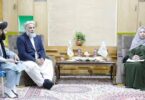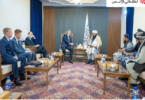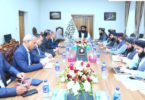KABUL (Agencies): Men and women dining out together or strolling in parks is now forbidden in Afghanistan’s western city of Herat, Taliban authorities have said. The new restrictions follow last week’s order for women across Afghanistan to fully cover when in public and appeared to signal the Taliban’s tightening grip on power.
Riazullah Seerat, a Taliban official at the Ministry for Promotion of Virtue and Prevention of Vice in Herat, said that authorities “have instructed that men and women be segregated in restaurants”. Restaurant owners had been verbally warned that the rule applied “even if they are husband and wife”, he said.
The Taliban official also said his office has issued a decree that Herat’s public parks should be segregated by gender, with men and women permitted to visit only on different days. “We have told women to visit parks Friday and Saturday,” he said.
“The other days are kept for men who can visit for leisure and for exercise.” Women wanting to exercise on those days should find a “safe place or do it in their homes”, he added. Safiullah, a restaurant manager who, like many Afghans, goes by only one name, confirmed he had received the ministry diktat. “We have to follow the order, but it has a very negative impact on our business,” Safiullah said, adding that if the ban continues he will be forced to fire members of his staff.
An Afghan woman who did not wish to be identified said a manager told her and her husband to sit separately at a restaurant. While there are no restrictions, yet, on women driving in the city, driving instructors have been ordered to stop issuing licences to female motorists, AFP reported. The Taliban toppled an internationally-backed government last August promising a softer rule compared with its previous stint in power from 1996 to 2001 which was marked by human rights abuses and the imposition of ultra-conservative laws based on a severe interpretation of Islam.
Recently announced decrees, especially in terms of gender segregation, undermine such promises. In their harshest restrictions since seizing power, the Taliban ordered last week that all women cover up – ideally with a burqa – in public and assigned criminal punishment for the first time for violation of the dress code for women. In December, the group also imposed a ban on women from travelling further than 72km (45 miles) without a close male relative. While on March 23, a few hours after girls were expected to return to their high schools, the interim authorities announced their closure.
The growing restrictions came despite the international community having repeatedly warned the Taliban that the release of donor funds is pegged to the improvement of human rights and gender reforms. Afghanistan has been reeling from a humanitarian crisis with more than half of the population facing hunger. The Taliban has struggled to revive the aid-dependent economy, which is in free fall due to sanctions and exclusion from international financial institutions. The Group of Seven (G7) foreign ministers said the increasing restrictions imposed by the Taliban on the rights of women and girls in Afghanistan were isolating the country.
In a joint statement published by France, the ministers called on the Taliban to take urgent action to lift restrictions on women and girls and respect their human rights. “With these measures, the Taliban are further isolating themselves from the international community,” the G7 foreign ministers and European Union foreign policy chief said.






